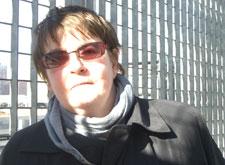Nicole Brossard is a lezzie legend in her own lifetime. Since she published her first book of poetry in 1965 the Québécoise writer has won numerous accolades, including the Governor General’s Award twice. She says it’s “the creative energy of lesbian desire” that shapes her writing — and it shows: Her subversive texts have become queer-theory classics around the world. An English translation of her new novel, Fences in Breathing, is published this month. It’s the story of Anne, a writer invited to a Swiss château by the mysterious Tatiana, a retired publisher with “a sharpness of mind that can cut through umbilical cords and black thoughts with a single reply.”
Brossard — who’s currently touring Europe — participated in this email interview during a Guinness break in Dublin.
ALICE LAWLOR: What inspired the new book? Does it have a lesbian aspect?
NICOLE BROSSARD: This book is still very mysterious for me. When I think of the second chapter, I enjoy the flow, the polyphony of the voices of the characters. I have the impression that I let the language move, flow, jump in a very special way that I don’t often experience but which I hope is full of good consequences for fiction and the poetic voice. Concerning the lesbian aspect of the book, it is within the narrator and the characters of Kim and June. It also imprints the language and establishes subliminal associations between sentences. I like it when sentences themselves work to create a lesbian atmosphere.
LAWLOR: The narrator, Anne, writes in a language that is not hers. Where does this language come from and what does it represent?
BROSSARD: I have always been fascinated by the idea of writing in another language than my own, something that many writers have done and still do more than ever. It is the notion of strangeness in the self and the freedom that we can find in another language that speaks to me. To write in another language than our own means entering a virtual space, probably wider than what we think of as fiction until now. Let’s say that it is a desirable language that’s fit to satisfy a language of desire and renewal.
LAWLOR: What effect do you want your writing to have on the reader?
BROSSARD: I certainly want my readers to think, feel and displace themselves from a standard point of view to another. I would like them to have that joy of reading that addresses the part in us capable of enthusiasm and renewal. I would like their reading of my books to be a vital plus in their lives. This is the way I feel about books, films, art and music when I am taken by them. I guess we could call it a sense of beauty and of melancholy that brings both peace and tension in the mind and in the heart.
LAWLOR: In 1988 you said, “Loving a woman is always political.” Is that still true today?
BROSSARD: I believe that choosing another woman as your erotic loved one has a symbolic powerful effect in one’s imagination and the cultural imaginary; and because of that it has political consequences and a social effect. I believe it is still true today and will always be until patriarchy as a system is symbolically obsolete.
LAWLOR: What do you think about the current gay rights movement? What do we still need to fight for?
BROSSARD: I am always amazed how easily we take for granted that the gay rights we have now will be there forever. There are still so many lesbians and gays living in parts of Canada where being gay can make someone desperately isolated and unable to enjoy the rights that already exist. In order to enjoy those rights you need to feel good and happy about what you are in your social environment. I believe this is still a work in progress.

 Why you can trust Xtra
Why you can trust Xtra


